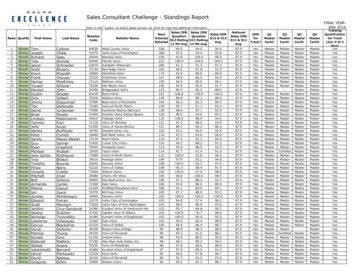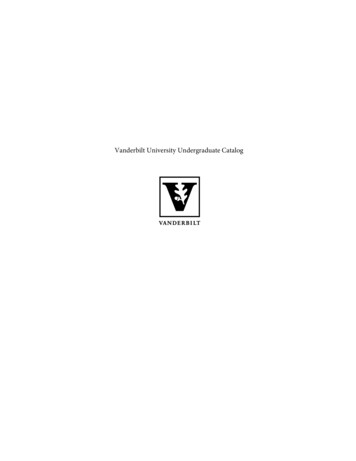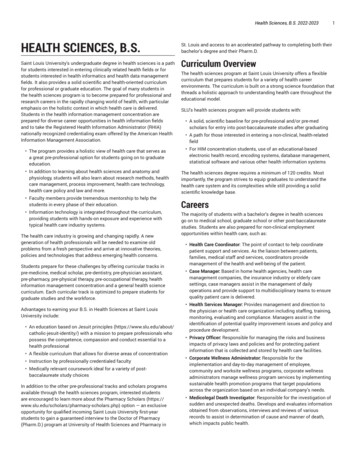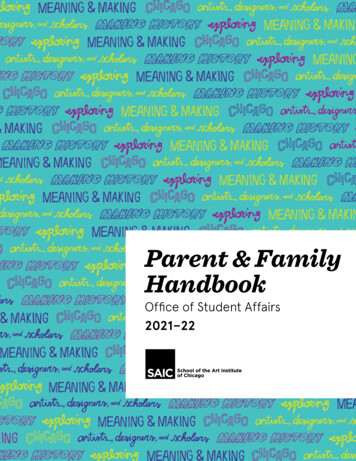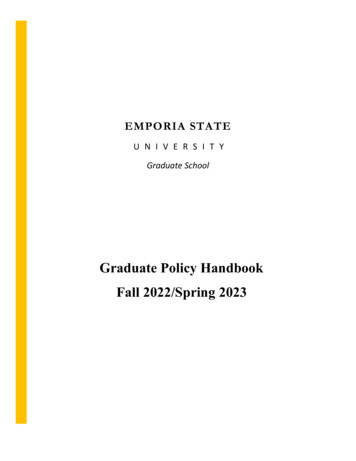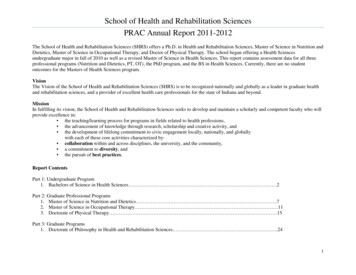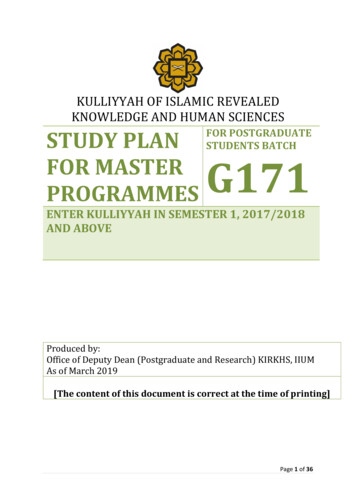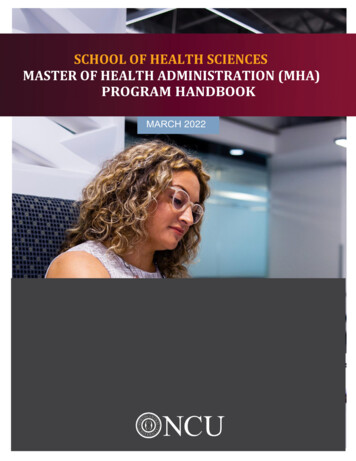
Transcription
SCHOOL OF HEALTH SCIENCESMASTER OF HEALTH ADMINISTRATION (MHA)PROGRAM HANDBOOKMARCH 2022
This handbook is neither a contract nor an offer of a contract. The material contained herein isnot intended to substitute for or otherwise modify the regulations that are contained in thecurrent NCU Catalog or any other official documents. This handbook was designed to documentrequirements specific to the Master of Health Administration (MHA) degree program. TheUniversity reserves the right to change any provision or requirement, including fees, at any timewith or without notice. The University further reserves the right to require a student to withdrawfrom the University for cause at any time. Failure to read this handbook does not excusestudents from the requirements and regulations described herein.Northcentral University welcomes all qualified adult students and does not discriminate on thebasis of race, color, religion, gender, sexual orientation, national origin, veteran status, ordisability. This applies to all Northcentral University policies, practices, or procedures involvingapplicants, students, faculty members, employees, and the public. Northcentral reserves the rightto refuse admission to anyone the University believes does not meet Northcentral Universityacademic standards or demonstrates actions or behaviors not aligned with NorthcentralUniversity policy.Copyright 2022 NorthcentralUniversity School of Health SciencesMaster of Health Administration ProgramMASTER OF HEALTH ADMINISTRATION (MHA) PROGRAM HANDBOOK2
TABLE OF CONTENTSMHA Program Welcome Message . 51 – INTRODUCTION. 6Health Administration/Healthcare Management . 6Overview of the MHA Program . 6Credit Hour Requirements . 7Course Sequence . 7Program Climate. 7Program Faculty . 72 – PROGRAM MISSION, VISION, AND VALUES. 8MHA Mission, Vision, and Values . 8School of Health Sciences Mission, Vision, and Values . 8University Vision, Mission, and Values . 93 – PROGRAM GOALS AND OUTCOMES . 10Program Goals . 10Program Learning Outcomes. 10Program Health Leadership Competencies. 10Interprofessional Education (IPE) . 114 – PROGRAM EVALUATION AND ASSESSMENT . 12Program Assessment . 125 – PROGRAM EXPECTATIONS . 12Student . 12Faculty . 156 – PROGRAM RESOURCES. 17Professional Advisory Council . 17Student Governance . 17SHS Student Advisory Council . 17Health Administration Honor Society . 17Student Support Services . 183MASTER OF HEALTH ADMINISTRATION (MHA) PROGRAM HANDBOOK3
TABLE OF CONTENTS (CONTINUED)7 - GENERAL PROGRAM POLICIES AND PROCEDURES . 19Recruitment of Students and Faculty . 19Anti-discrimination Policy . 19Admission Policy . 20Minimum Technology Requirements and Training . 21University Orientation . 21Code of Conduct Policy . 21Academic Integrity . 21University Course Policies . 22Grade Policy . 22Natural Disasters and University-wide Technology Outages . 22Satisfactory Academic Progress. 22Course Repetitions . 22Academic Leave of Absence . 23Program Probation . 23Resources Available to Students When Experiencing Difficulties . 23Dismissal From the Program . 23Time Limits for Degree Completion . 24Graduation Policy . 24Exit Interview, Alumni, and Employer Evaluation Surveys . 24Student Complaint and Grievance Procedures . 25APPENDIX A: STUDENT COMPETENCY EVALUATION.26APPENDIX B: SHS STUDENT IPE ACTIVITY TRACKING. 324MASTER OF HEALTH ADMINISTRATION (MHA) PROGRAM HANDBOOK4
MHA PROGRAMWelcome MessageOn behalf of the health administration faculty and staff, I want to welcome you to the Master inHealth Administration (MHA) program at NCU! Your academic journey is about to begin, and wehope this journey allows you to continue to seek and explore lifelong learning opportunities.Our goal is to prepare you to excel as a healthcare leader who will make positive impacts onthe diverse and dynamic healthcare sector. Upon graduating from our program, you will havedeveloped necessary healthcare leadership competencies, as well as skills in interprofessionalcollaboration that will allow you to successfully lead your organization and improve the healthoutcomes of the populations you serve.You will find our curriculum engaging and applicable to the realities of healthcare leadershiptoday, as well as in the future. Our faculty are experts who are here to mentor you on yourgraduate-level journey. Our unique one-to-one learning model, outstanding resources, andactive online student communities offer you the support that you need to succeed. You have ateam dedicated to your educational success, which in turn will assist you in realizing yourcareer goals!Again, welcome to the MHA program where you have what it takes!Best,Wittney Jones, PhD, MEdInterim DeanSchool of Health Scienceswjones@ncu.eduDirect any questions about the Handbook to the School of Health Sciences (shs@ncu.edu)5MASTER OF HEALTH ADMINISTRATION (MHA) PROGRAM HANDBOOK5
1 – INTRODUCTIONThis Handbook has been prepared to serve as a guide for students enrolled in the Master of Health Administration(MHA) degree program at Northcentral University. University-wide rules and regulations can be found in the NCUCatalog. The policies of this handbook are consistent with university policies and are intended to supplement, notreplace, university policies and procedures. In addition, the educational and training protocols of the program aredesigned to align with the National Center for Healthcare Leadership (NCHL) and the Interprofessional EducationCollaborative (IPEC) competency models.Please read this handbook carefully, as you are expected to know this information. If you have any questions, pleasecontact the MHA Program Director in the School of Health Sciences at shs@ncu.edu. This document will berevised periodically to reflect necessary programmatic changes that may occur due to changes in the profession, theUniversity, and other requirements or relevant contexts. All policies, and any changes to these policies, shall bereviewed and approved by the appropriate administrative personnel and will be communicated to students asneeded.This handbook shall be distributed to the following named persons or groups of persons: 1) All faculty members,staff, and leadership associated with the MHA Program; and 2) All students both current and entering the MHAdegree program.Health Administration/Healthcare ManagementAccording to the American College of Healthcare Executives (ACHE), healthcare administration or management isa broad field in which an individual employed in the healthcare sector influences the mission, vision, values, and beliefsof the healthcare organization. With this in mind, healthcare executives and managers, who are most often servicecentered, have the opportunity to make a significant contribution to improving the health of the communities theyserve. Health administrators and managers have excellent earning potential and are usually highly respected andvisible members of their communities.Career opportunities in health administration exist in every type of community – from small rural communitiesto large metropolitan areas, and even in international regions. Health administration provides career flexibilitybecause not only are you able to work in a traditional healthcare setting, such as hospitals or nursing homes,graduates of NCU’s DHA program may have the unique opportunity to work in many different types of healthservices organizations, including accountable care organizations (ACOs), physician group practices, home healthagencies, pharmaceutical and device manufacturers, consulting, and insurance companies. In addition, theincreasing role of government in healthcare translates into more significant and more plentiful government and publicpolicy positions. Our graduates may work for state health departments, private foundations, federal programs, ornational associations, such as the U.S. Department of Health and Human Services, American Hospital Association,and the American Red Cross.Overview of the MHA ProgramNorthcentral University, a regionally accredited educational institution, uses distance-based (online) education asthe predominant method of instruction and interaction for its degree programs. The MHA program is housedwithin the School of Health Sciences (SHS) and is aligned with the accreditation standards of the Commission onAccreditation of Healthcare Management Education (CAHME). The MHA program is an associate member of theAssociation of University Programs in Health Administration (AUPHA) and participates in the American College ofHealthcare Executives (ACHE) Higher Education Network.MASTER OF HEALTH ADMINISTRATION (MHA) PROGRAM HANDBOOK6
The program was founded on the principles of interprofessional education and is designed to provide a high-qualityeducational experience that will prepare students for success in entry- to mid-level executive positions in thehealthcare industry. The program will present essential competencies and learning experiences to enable andprepare graduates to lead and effect change in complex and diverse healthcare organizations.Credit Hour RequirementsThe MHA degree is 42 credits, earned through the completion of 14 courses. While students may pursue studiesat their own pace, the recommended time to MHA degree completion is 29 months. The shortest time to degreecompletion is 23 months.Course SequenceMHA-5000Introduction to Healthcare ManagementMHA-5001Quantitative Analysis for Healthcare ManagersMHA-5002Health Management Leadership SeminarMHA-5103Healthcare FinanceMHA-5004Health Policy & AnalysisMHA-5005Healthcare Quality ManagementMHA-5006Health Information ManagementMHA-5007Managerial Accounting for Healthcare ManagersMHA-5008Healthcare Strategic Management & MarketingMHA-5109Health EconomicsMHA-5010Health Law & EthicsMHA-5011Population Health ManagementMHA-5012Human Resource ManagementMHA-5999MHA CapstoneProgram ClimateThe University and MHA Program support the climate of safety, respect, and appreciation for all students. For further informationregarding our policy, please review the “Student Rights and Responsibilities” section of the NCU Catalog.MASTER OF HEALTH ADMINISTRATION (MHA) PROGRAM HANDBOOK7
Program FacultyThe faculty in the SHS are accomplished healthcare professionals from various related disciplines. Consistent withNCU’s standard, 100% of the faculty hold doctoral degrees. The faculty is made up of diverse professionals with avariety of cultural and professional backgrounds. The healthcare administration department is made up of full- timeand part-time (adjunct) faculty, with the majority of students being taught by the full-time faculty. Faculty areencouraged to participate in teaching, scholarship, service, and practice activities that enable the program toachieve its goals and outcomes.2 – PROGRAM MISSION, VISION, AND VALUESThe program’s mission, vision, and values were intentionally crafted to reflect and support the School of Health Sciences’ and NCU’smission, vision, and values.MHA MISSION:Our mission is to prepare individuals for early and mid-career healthcare leadership roles. Our curriculum integrates essential leadershipand management competencies with interprofessional practices, enabling our graduates to make evidenced-based decisions that willeffect change in the complex and diverse healthcare industry. Our one-to-one learning model for students provides a uniqueopportunity for our highly qualified faculty to be engaged in scholarship, practice, and service. Faculty are able to mentor andimpart contemporary knowledge, skills, and values necessary for our graduates to work effectively across healthcare disciplines toultimately improve health outcomes and health systems.MHA VISION:To be the premier choice for individuals seeking an online master’s degree in health administration.MHA VALUES:Excellence: Setting the highest standards for our students, faculty, and program to ensure we provide quality educational andinterprofessional learning experiences.Interprofessionalism: Using the core elements of interprofessional education and collaborative practices – includingteamwork/team-based practice, communication, values/ethics, and roles and responsibilities – to support enhanced understanding as facultyand students work on common goals related to improving health outcomes and health systems.Diversity and Inclusion: Embracing differences of culture, thought, and action, and believing that the perspectives of allpeople enhance all aspects of healthcare management education.Integrity: Demonstrating professionalism, ethical behavior, evidence-based decision making, and service while being committedto lifelong learning and professional development.Communication: Applying effective written and oral listening skills, along with the use of technology, to prepare and deliverprofessional documents and presentations, build relationships, and lead teams to enhance all aspects of the healthcare sector.School of Health Sciences Mission, Vision, and ValuesMISSION:Developing leaders who are culturally competent and experts in interprofessional healthcare practices.MASTER OF HEALTH ADMINISTRATION (MHA) PROGRAM HANDBOOK8
VISION:To be recognized as the premier online graduate school in the health professions.VALUES:Communication: SHS will be defined by the clear, intentional, and effective articulation of health sciences pedagogyas deliberate, timely, and respectful assessment.as wellDiversity and Inclusion: SHS will embrace diversity of culture, thought, and action; therefore, we believe that the inclusion ofdiverse people and perspectives enhances all aspects of health sciences education.Interprofessionalism: SHS will employ educational standards that allow faculty and students from various health sciencesdisciplines to collaborate with one another to produce improved health outcomes.Innovation: SHS will make use of advanced education delivery systems and state-of-the-art technology to ensure the bestenvironment for health sciences teaching and learning.Efficacy: SHS will equip students with the ability to produce exceptional healthcare outcomes.University Vision, Mission, and ValuesPlease visit the NCU Catalog for NCU’s Vision, Mission, and Values.MASTER OF HEALTH ADMINISTRATION (MHA) PROGRAM HANDBOOKMASTER OF HEALTH ADMINISTRATION (MHA) PROGRAM HANDBOOK99
3 – PROGRAM GOALS AND OUTCOMESProgram GoalsThe MHA program goals align with our mission, vision, and values. Our goals represent the type of students we want to enroll in ourprogram, as well as identify the industry position our graduates will have and the skills we want them to use effectively in theworkplace.PROGRAM GOAL I: Enroll diverse and qualified students.PROGRAM GOAL II: Prepare students for successful early to mid-career healthcare leadership roles.PROGRAM GOAL III: Prepare students for interprofessional practice within the diverse health sector.PROGRAM GOAL IV: Prepare students to utilize healthcare data for evidence-based decision making.Program Learning OutcomesProgram learning outcomes (PLOs) represent students’ cumulative learning across all courses by the end of the MHA program, andtransfer into applicable knowledge and skills they can use in their careers. The PLOs are the focus of student assessment throughoutthe program.Upon completion of the MHA program, you, as an adult learner and graduate, will be able to: Manage strategic projects and action plans in healthcare organizations. Assess institutional financial and healthcare delivery performance. Examine community healthcare needs per industry standards. Model accountability with respect to compliance in policy, regulation, and ethical codes of conduct. Analyze organizational needs based on clinical and financial data.Program Health Leadership CompetenciesHealthcare leaders require a level of expertise and skills that are not typically attained at the undergraduate level. A master’s degreein health administration is recognized by professional organizations, such as ACHE, as the essential first step toward an executiveand managerial career in most healthcare organizations. With this in mind, the MHA program is committed to ensuring that effectivehealth leadership is cultivated through the development of essential core competencies – the knowledge, skills, attitudes, and values –that can be applied to any career level.Our MHA program focuses on competencies from the National Center for Healthcare Leadership (NCHL) Health LeadershipCompetency Model. Founded on interprofessional education, competencies from the Interprofessional Education Collaborative (IPEC)model are woven throughout the curriculum. These models were developed by interdisciplinary subject matter experts and arerecognized by the field of healthcare management education, as well as the healthcare industry itself, for providing a consistent andcomprehensive foundation for leadership assessment. These competencies will be evaluated throughout the program.Below is a representation of the MHA competency model.MASTER OF HEALTH ADMINISTRATION (MHA) PROGRAM HANDBOOK10
Project Management Strategic Orientation Team Leadership Analytical Thinking Financial Skills Information Seeking Innovative Thinking Performance MeasurementHEALTHLEADERSHIP Accountability Professionalism Collaboration Community Orientation Process Management &Organizational DesignKnowledge of Health Sector& Healthcare ManagementInterprofessional Education (IPE)One of the foundational values of the School of Health Sciences (SHS) and the MHA program is interprofessional education (IPE). IPE isdefined as “when students from two or more professions learn about, from and with each other to enable effective collaboration andimprove health outcomes” (WHO, 2010). As the complexity of issues impacting patients’ health increases, SHS is dedicated topreparing students who are highly competent and skilled at collaborating with others in the field to address patient and industry needs.IPE and collaborative practice has been integrated into each of the academic programs in SHS.SHS intentionally seeks opportunities to provide IPE activities for and with our students. An IPE Discussion Forum within our studentengagement network, the Commons, has been established, allowing students and faculty from the various SHS disciplines (healthadministration and nursing) to engage and interact with each other. All faculty have experience in their respective industries and thisforum allows for engagement on various levels. Additionally, SHS has established a monthly IPE Speaker Series (via Zoom webinar).Industry leaders serve as guest speakers to bring relevant topics to our faculty and students. The case studies and questions and answerssegments has proven to be very engaging for students across their respective disciplines. In the true spirit of IPE, other health-focuseddisciplines and programs/schools have been invited to participate in the Speaker Series, including schools/programs within NCU, as wellas programs/schools/colleges outside of NCU with which we have collegial relationships.MASTER OF HEALTH ADMINISTRATION (MHA) PROGRAM HANDBOOK11
MHA students are required to participate in a minimum of six Interprofessional Education (IPE) activities during theirtenure in the program. MHA students are encouraged to participate in the IPE Speaker Series on a monthly basis, by eitherattending the live webinars or by watching the recorded webinars at a later time. IPE events outside of SHS may also be accepted andneed to be approved by the MHA Program Director. All activities should be tracked and documented (see Appendix B).If you have questions related to the IPE Speaker Series, the IPE Discussion Forum, or the tracking form, please contact the MHAProgram Director via shs@ncu.edu.4 – PROGRAM EVALUATION AND ASSESSMENTThe MHA program utilizes an ongoing assessment cycle as part of its strategic plan for quality continuous improvement. The assessmentcycles include the following activities: 1) Gathering data, 2) Analyzing and interpreting data, 3) Developing action plans based on thedata, and 4) Measuring successes of action plans and initiating subsequent cycles. Educational and program outcome data, as well asprogram performance data, are reviewed annually. This review is performed in order to revise outcomes per industry standards, toreflect MHA core competencies, educational guidelines, and evidence-based trends. Specifically, action plans are created to improveeducational outcomes, curriculum, and overall program quality based on outcome data as well as faculty and student feedback. Action plansare also reviewed annually. The aggregated data and subsequent analysis are provided to various Communities of Interest (COI) at NCU,including but not limited to faculty, students, alumni, SHS Student Advisory Council (SAC), SHS Professional Advisory Council (PAC), healthindustry employers, University administration, accrediting bodies, and others as appropriate. Feedback is requested from eachcommunity of interest, which is then used to implement change and improvement in the program, its policies, and procedures.Program AssessmentThe purpose of program assessment, which includes many aspects (curriculum, teaching, learning, assessment methods, andinstructor effectiveness), is for continuous quality improvement of the program, ensuring we are meeting the needs of our students,accrediting organizations, and the health care industry. The assessment cycle is an evidence-based, iterative cycle of planning,implementing, assessing, and improving learning outcomes and program performance.The MHA Program Director is responsible for overseeing the assessment of the MHA program. Institutional support for data gathering,analysis, and documentation of assessment activities is provided via the SHS Assessment Director. The Program Director meets regularlywith MHA faculty to review assessment data and implement program improvements/modifications.5 – PROGRAM EXPECTATIONSStudentStudents in the MHA program, as current or future healthcare leaders and professionals, are held to established standards andexpectations. These expectations directly align with the program’s values.1. Students are expected to adhere to all NCU policies, procedures, and codes of conduct.2. Students are expected to be professional, respectful, and abide by the ACHE Code of Ethics.MASTER OF HEALTH ADMINISTRATION (MHA) PROGRAM HANDBOOK12
3.Students have the responsibility to communicate with the MHA faculty and administration.a. Communication with course faculty may be conducted by email, phone calls, and online conferencing such as Zoom orSkype.b. Students are expected to engage in one-to-one conversations with course faculty, per the NCU learning model.Conversations should be expected in, but not limited to, the first week of student courses.c. Students are expected to contact course faculty and/or the program director if they are experiencing difficulties in acourse and/or in their personal or professional lives.d. Communication with course faculty must be timely, either prior to or directly after any unforeseen circumstance. Studentsshould not wait until after the course is over to discuss a late or missing assignment with course faculty.e. Communication must be professional and respectful.f. Communication must follow proper netiquette. Netiquette is the term used to describe expected etiquette behaviors in anonline environment. This includes but is not limited to: Use of complete sentences, proper spelling, and grammar. Avoid the use of slang, obscene words, swearing, cussing, cursing, or threatening language. Be respectful of differences and value others’ opinions (even if you are in disagreement).g.Students should only use their NCU email for course/school online correspondence. Students are expected to check their NCU email regularly, preferably daily. Students are expected to respond to emails in a timely fashion — within 24–48 hours.4. Students are expected to adhere to graduate-level writing, which is scholarly and rigorous. Graduate-level writing goes beyond theexpected minimum of the assignment instructions, broadens the topic from course room to professional life, is based on evidence, andsynthesizes different points of view. Graduate-level assignments are to be written clearly and succinctly; have limited use ofquotations; and utilize proper syntax, grammar, punctuation, and spelling consistently.5. Students are expected to use APA formatting for all assignments unless otherwise noted. NCU has many resources available tostudents to help with APA and writing skills.6. Students are responsible for all course material and are expected to complete all coursework by the assigned due dates. Allassignments are due on Sundays by 11:59 p.m. Arizona time, per NCU policy.MASTER OF HEALTH ADMINISTRATION (MHA) PROGRAM HANDBOOK13
a. The NCU grading scale for graduate students is as follows: A 100-94 A- 93-90 B 89-87 B 86-83 B- 82-80 C 79-77 C 76-73 F 72-0b. Students have the responsibility to review all feedback provided by the course faculty on student assignments and are expected toapply this feedback to future assignments. If faculty feedback is unclear, the student is expected to contact the course facultyfor clarification.c. MHA LATE ASSIGNMENT AND GRADING POLICY Week 1 Extensions – When a student accepts a course late, with Monday being the expectedcourseacceptance day, faculty may grant the student additional days (equal to the numberof days of late acceptance), to submit Week 1 assignment(s). This only applies to Week 1assignments; allother assignments are due by said due dates. If an assignment is submitted 1-6 days late and without prior communication and authorization from faculty, a 5%deduction is taken every day the assignment is late. This deduction occurs before other deductions for issues withcontent, critical thinking, grammar/APA, and resource use. Feedback on the assignment will be provided by thefaculty member and the grade earned will be posted. If an assignment is submitted 7 or more days late without prior communication and authorization from faculty, theassignment will not be accepted, meaning it will not be graded and no feedback will be provided. In addition, course work will not be accepted after the course end date (Week 8) and/or approved courseextension end date. This aligns with NCU’s Assignment Submission and Return and Grading Late Workpolicies.d. EMERGENCY EVENT OR EXTENUATING CIRCUMSTANCE If a student anticipates missing an assignment deadline due to anemergency event or extenuating circumstance, it is the responsibility of the student to contact the course faculty PRIOR to thedue date, if at all possible, to make arrangements for an extension to the due date. An extension may or may not be granted.Overdue assignments may or may not be accepted with or without penalty. If the student is unable to contact the course facultyprior to the event/circumstance, the student should contact the faculty as soon as they are able. If you are unable to contact toyour faculty and a family member reaches out to your faculty member, faculty are not allowed to communicate with familymembers and will direct your representative to the Academic Financial Advisor. Documentation maybe required by coursefaculty to accept the late assignment.7. All student course work is expected to be original and written specifically for the course in which it is assigned. Plagiarism, whetherintentional or unintentional, is an academic integrity violation. This includes self-plagiarism.MASTER OF HEALTH ADMINISTRATION (MHA) PROGRAM HANDBOOK14
a. Academic recy
MASTER OF HEALTH ADMINISTRATION (MHA) PROGRAM HANDBOOK 7 The program was founded on the principles of interprofessional education and is designed to provide a high-quality educational experience that will prepare students for success in entry- to mid-level executive positions in the healthcare industry.
